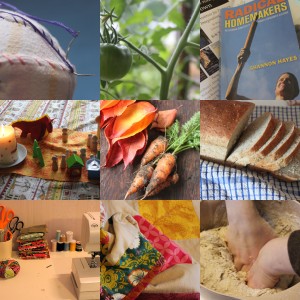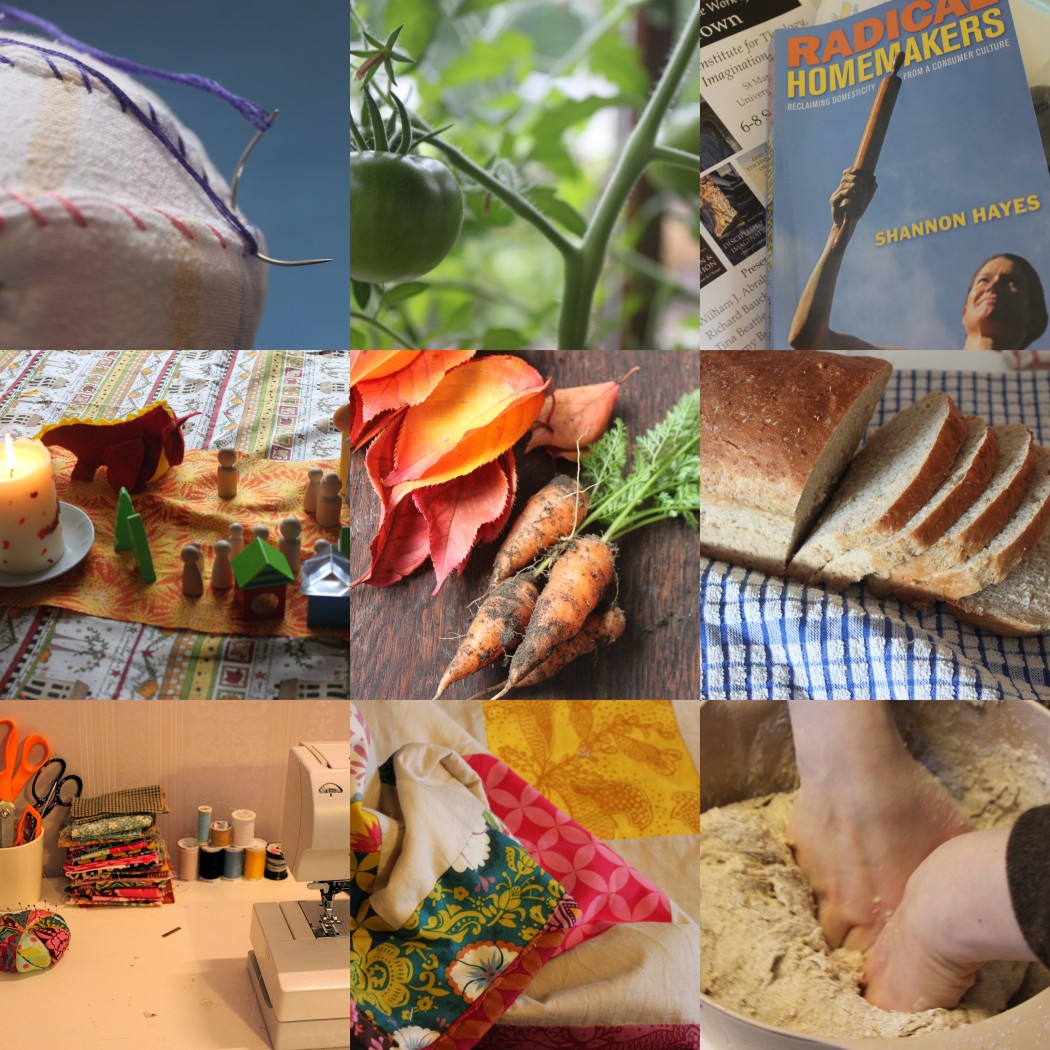
As many mothers who begin to ‘stay at home’, I struggled to define my role and justify my decision to cease employment. I know there are some women who chose to ‘stay home’ and never look back, but for me it has been a journey of making meaning and discovering what it means to a home-maker. I have come to see my role as one who strives toward right relationships with God, others, creation and self. I would argue this is what it means to be a Christian and for each of us, this pursuit will look different. But for me, right now, it means seeking to return the home to a unit of production in the midst of a consumer culture.
As I was solidifying my ideas of being a homemaker that seeks to live simply, work toward sustainability and serve community I came across this article in the New York Times and promptly found the book Radical Homemaking by Shannon Hayes. While Hayes’ book doesn’t claim to be Christian, I was surprised that her view of the ‘Radical Homemaker’ lined up with the Christian vision of seeking right relationship with God, others, self and creation that had been forming my definition of homemaking. Hayes describes radical homemakers as
More than just soccer moms, Radical Homemakers are men and women who have chosen to make family, community, social justice and the health of the planet the governing principles of their lives. They reject any form of labor or the expenditure of any resource that does not honor these tenets. (pg 13)
In our contemporary context we’ve been taught to see the home as a haven from work and productivity. Labor saving devices and processed foods have made it possible to distance ourselves from the daily work of homemaking. And while there is a place for both rest and convenience, part of the quest to see the home as productive means valuing work as something life-giving and something to be embraced, and not as something to escape. It means embracing skills that have been cast aside by many as unnecessary and even degrading. If I add up my time and materials it is cheaper to buy winter caps for my family, but I choose to make them because the act of creating the things we need leads us toward a more real understanding of cost and gives us much more value. Hayes states
When we regain connection with all that sustains us, we regain a creative spirit. We rediscover the joy that comes with using our hands and our minds in union to nourish, nurture and delight in our families; we tap the source of true creative satisfaction, the ecstasy that accompanies a home that lives in harmony with the earth’s systems, an the certitude of a life guided by principles of social justice and non exploitation. (pg 83)
I would add that in doing this we draw ourselves not only in to right relationship with creation and further the work of social justice, but we also further our relationship with the Creator of all things, as we become more fully human and bring about the kingdom of God.
Emily has a masters from Regent College in applied theology. She is a homemaker and keeps a daily blog on the extra-ordinary of daily mothering and domestic arts.





Thanks for this post, Emily. The book Radical Homemakers has intrigued me since I first saw it on Amazon, and your reflections make me even more eager to read it.
I’m glad you enjoyed the post. The book is an interesting read, I’d love to know what you think if you read it. It covers so much more than I was able to bring to light in this small space and is a book I will revisit from time to time (at least parts of it).
Thanks for these reflections on the value of making a home. I, too, have opted to make things for myself and my family even though I can buy similar things more cheaply. However, I often find that I can’t actually buy the things I want more cheaply than I can make them, if I can buy them at all. Just one example: I can buy a wooden spoon for the kitchen very cheaply, but I have never been able to find a commercially-made spoon that I have been happy with. But if I’m willing to spend an hour at the workbench, I can produce something that works well and that is fitted to my own hand, and to the kind of work that I do most often in the kitchen. I can buy something that may vaguely resemble what I want, but I can’t buy what I actually want, especially now that I know I can make it. The satisfaction of having made something useful that I can now share with my family almost goes without saying.
Thanks for this comment. I totally agree that you can’t actually buy what you could make more cheaply in one sense. All hats (0r spoons) are not equal. There is such satisfaction from making the things our families need and I love the art element of homemade items that mass produced items lack.
After preparing the Tidbits post (where i mention this book and link to some articles by Hayes) and then reading your post, I bought the book. I was also recommended “Quotidian Mysteries” by Katherine Norris which i’ve also ordered. I’ll be sure to share that with you when it comes!
Thanks for an inspiring post!
I’ve ordered so many books off the back of this week’s posts – in fact i rarely buy books that are not specifically related to my research. But this week has prompted more thoughtful reflection on how, even though it’s not an environment i’m used to, i’m going to make a more concerted effort to incorporate those aspects of homemaking that nourished me growing up and which I know will enrich my daily life. I love being able to share with others but i think graduate school (and moving to different countries) has forced a kind of minimalism i’ve existed with by necessity rather than by choice….at least i thought it was by necessity. This is not about having or not having stuff….but about what kind, and why, and nourishing the soul in the home!
Thanks for your thoughts Anna and I’ll look forward to hearing what you think of both Norris’ and Hayes’ books. I love “Quotidian Mysteries” and will leave you with this quote from it (which was typed for the above post, but then not included). I think it restates a lot of what you reflected above.
“Laundry, liturgy and women’s work all serve to ground us in the world and they need not grind us down. Our daily tasks, whether we perceive them as drudgery or essential, life-supporting work, do not define who we are as women or as human beings. But they have a considerable spiritual import, and their significance for Christian theology, the way they come together in the fabric of faith, is not often appreciated But it is daily tasks, daily acts of love and worship that serve to remind us that the religion is not strictly an intellectual pursit.”